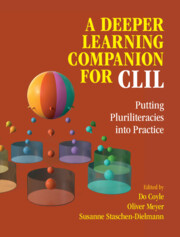Book contents
- A Deeper Learning Companion for CLIL
- A Deeper Learning Companion for CLIL
- Copyright page
- Contents
- Tables
- Figures
- Contributors
- Preface
- Part I Key Ideas and Principles of Pluriliteracies Teaching for Deeper Learning
- Part II Deeper Learning Episodes: First Steps towards Transforming Classrooms
- 5 Chemistry: Exploring Pluriliteracies through a Deeper Learning Episode on Redox Reactions
- 6 Physics: Exploring Pluriliteracies through a Deeper Learning Episode on Rainbows
- 7 Geography: Exploring Pluriliteracies through a Deeper Learning Episode on Global Warming
- 8 History: Exploring Pluriliteracies through a Deeper Learning Episode on the German Empire
- 9 Political Science: Exploring Pluriliteracies through a Deeper Learning Episode on Electronic Waste
- 10 Modern Languages: Exploring Pluriliteracies through a Deeper Learning Episode in French Literature with Younger Beginner Learners
- 11 Religious Education: Exploring Pluriliteracies through a Deeper Learning Episode on Modern-Day Prophets
- 12 Music: Exploring Pluriliteracies through a Deeper Learning Episode on ‘The Wellerman’
- 13 Deeper Learning Mathematics
Conclusion: Moving beyond First Steps by Using PTDL for Whole-School Development and Transformation
from Part II - Deeper Learning Episodes: First Steps towards Transforming Classrooms
Published online by Cambridge University Press: 04 February 2023
- A Deeper Learning Companion for CLIL
- A Deeper Learning Companion for CLIL
- Copyright page
- Contents
- Tables
- Figures
- Contributors
- Preface
- Part I Key Ideas and Principles of Pluriliteracies Teaching for Deeper Learning
- Part II Deeper Learning Episodes: First Steps towards Transforming Classrooms
- 5 Chemistry: Exploring Pluriliteracies through a Deeper Learning Episode on Redox Reactions
- 6 Physics: Exploring Pluriliteracies through a Deeper Learning Episode on Rainbows
- 7 Geography: Exploring Pluriliteracies through a Deeper Learning Episode on Global Warming
- 8 History: Exploring Pluriliteracies through a Deeper Learning Episode on the German Empire
- 9 Political Science: Exploring Pluriliteracies through a Deeper Learning Episode on Electronic Waste
- 10 Modern Languages: Exploring Pluriliteracies through a Deeper Learning Episode in French Literature with Younger Beginner Learners
- 11 Religious Education: Exploring Pluriliteracies through a Deeper Learning Episode on Modern-Day Prophets
- 12 Music: Exploring Pluriliteracies through a Deeper Learning Episode on ‘The Wellerman’
- 13 Deeper Learning Mathematics
Summary
The pedagogic considerations and practical ideas presented in this volume offer, we believe, a compelling rationale for exploring the potential of deeper learning across a wide range of subjects through an explicit focus on subject literacies that:
Promote the prioritisation of deeper understanding of subject-specific concepts alongside subject-specific ways of constructing and communicating that understanding.
Illustrate how a continuous focus on meaning-making and languaging of understanding will not only support and facilitate conceptual understanding of subject content but will also render learning more transparent by making subject-specific thinking and processing visible and thus more accessible and easier to grasp for learners.
Emphasise that using more than one language in subject lessons to highlight subject-specific ways of meaning-making across languages can be a powerful learning catalyst. This is because a focus on PLURI-literacies will create synergies that will increase our learners’ meaning-making potential by empowering them to successfully communicate across subjects and languages, purposefully using a wide variety of genres, modes and styles.
Show that the concept of deeper learning episodes (DLEs) is compatible with a wide range of subjects. At the same time, the experts report that our suggested template for designing such episodes, along with the guiding questions we developed, constitute useful planning tools that offer practitioners effective, systematic and adaptable guidance in designing DLEs.
- Type
- Chapter
- Information
- A Deeper Learning Companion for CLILPutting Pluriliteracies into Practice, pp. 288 - 292Publisher: Cambridge University PressPrint publication year: 2023

